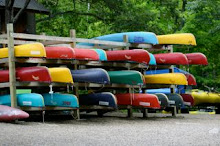Bear Sense
About one week before we left to run the upper Missinaibi from Missinaibi Lake to Mattice in 2007, I discovered an article on line about a fatal bear attack at Missinaibi lake the preceding fall. We love to canoe and wilderness camp, but basically that had involved hiding the M&Ms from thieving chipmunks and an occasional moose spotting. Not only were we bringing our 9 year old daughter, Hannah, our neighbors were letting us take their 10 year old son, Christian. I kept imagining the phone call home: "Sorry a bear ate your son, but if it is any consolation, the bear ate Hannah, too." I decided to do a little more research. After all, information is power. Turned out that the Chapleau Wildlife Preserve through which we were paddling is home to the largest population of black bears on earth. When I called the outfitter to ask him about this, he said the bears weren’t a big problem if we carried a 12 gauge. Given how tensions go up between family members on these trips, we couldn’t risk carrying weapons, so we called our Canadian friends, Dwayne and Mark because being Canadian in our minds automatically makes you an expert in all things outdoors, especially bears. Dwayne suggested we purchase bear spray and bear bangers, which are like little fire crackers/bullets you wear around your neck and shoot at bears if they get too close or aggressive. It took us 20 minutes to figure out how to work a bear banger - just enough time to make any bear die laughing or die from boredom. So we turned to Mark who knows us even better than Dwayne and he suggested a simpler solution to the bear problem: Just out run the next person or simpler yet, trip ’em.
Note bear spray, ax, saw, fire, (bear banger under jacket) and a cup of whiskey.
We were 10 days on the river and never let down our vigilance. We wore bells on the portage trails. We ate away from our tents. We traveled in groups, and carried the bear spray and bear bangers. We even dumped all our dishwater down the makeshift latrines. And that is how we met some more Canadians on the Missinaibi. When we were forced to share a campsite late one evening, I had to cut through their campsite in order to dump out the dishwater in the thunderbox. Perhaps I should have paid more attention because as I threw the water down the latrine, I saw three bowls and half of our eating utensils fly out, too. I did debate about mounting a rescue operation but in the end decided no amount of washing would make me use those spoons again. In retrospect, I think that should have been a sign -a warning of sorts. Later that evening, the Canadians came down to gut their fish next to our tents and we started chatting in the manner that all canoe trippers do when they met a new face after enduring the same company day in and day out. We talked about our trips, our canoes, our routes and finally about the BEARS. They informed us that all this bear neurosis was BS - which of course was why they were unconcerned about all the fish innards washing back up toward our tents. I mean not only were these guys Canadian, they really, really knew how to fish whereas we hadn't caught a thing. More proof if you ask me that Canadians are experts in all things outdoors. Given that we were on the same river, we figured that we would run into each other over the next couple of days. They were good guys, and promised that when we met up again they would teach Christian how to nab some Missinaibi fish.
But, by the last night when we reached Glassy Falls, they were no where to be seen. Christian was really disappointed and I wondered if they had deliberately avoided us the rest of the way down the river. I mean between three adults, two teenagers and two kids, we were really loud. It didn't really matter though because we had Glassy Falls to ourselves and we now knew those Canadians were right. We hadn't seen hide nor hair of a black bear since we started the trip. Besides, Glassy Falls is like a slice of heaven with a large white sand beach on which we camped and played. So, we tossed caution to the wind. After the kids swam all afternoon, we ate at our tents and dumped our leftovers into the fire next to us before crawling into bed to weather out a sudden rain shower.
Glassy Falls from the edge of the beach. Does it get any better than this?
In the morning as we packed up the boats, Hannah and Christian wander off by themselves down the river. Just as we finished packing the boats Christian ran back all excited because he found fish teeth at the edge of the river. "And there were bear tracks all over" he said as we paddled off. It took me about 10 minutes to realize that these were fresh tracks laid down after the rain, but the kids were fine and we were headed home. When the outfitter pick us up that afternoon in Mattice, the first thing he said was "Did you have trouble at Glassy Falls?" When we asked him why, he said that a group of Canadian paddlers traveling down the Missinaibi had been chased out of the campsite the day before by black bears. I am sure the technical moral of the story is that not all Canadians are experts in all things outdoors, but I like to believe that it is equally true that being noisy Americans does occasionally pay off in the wilderness as well.


